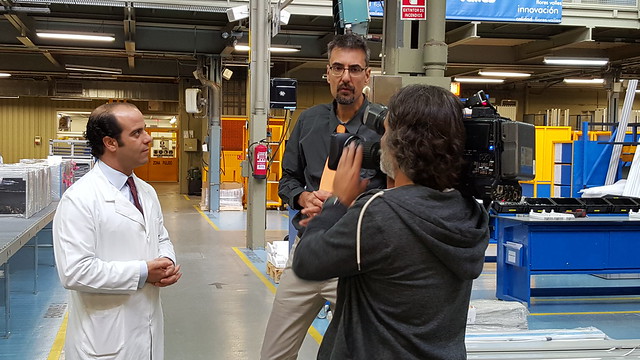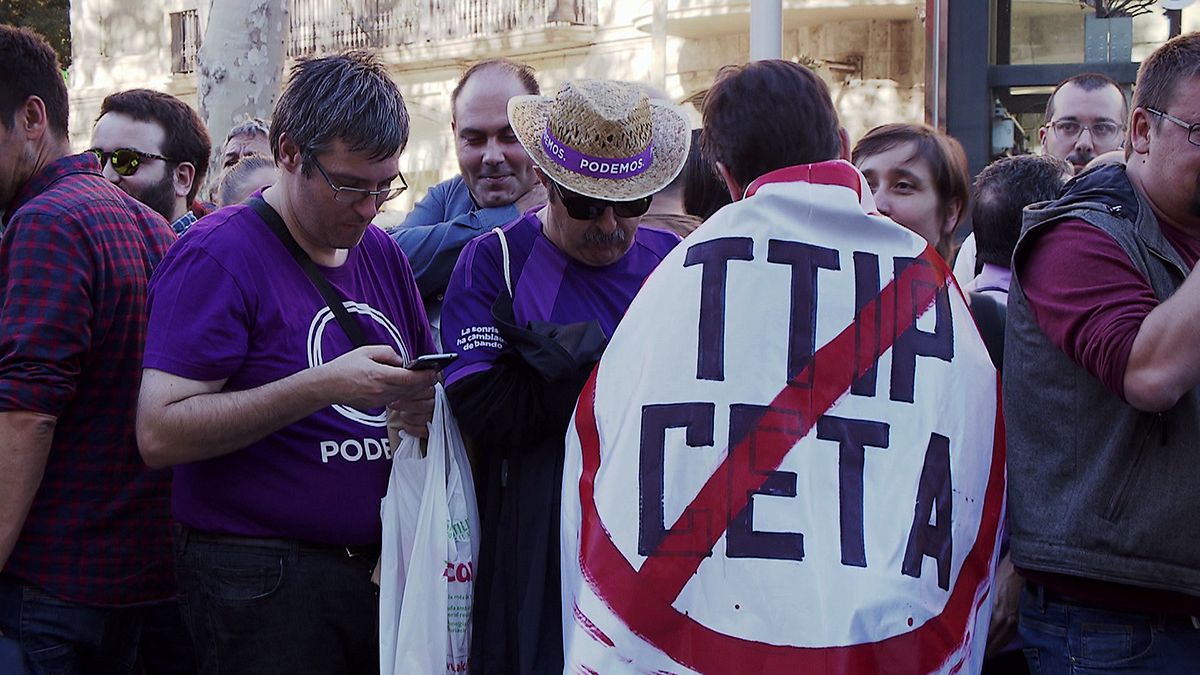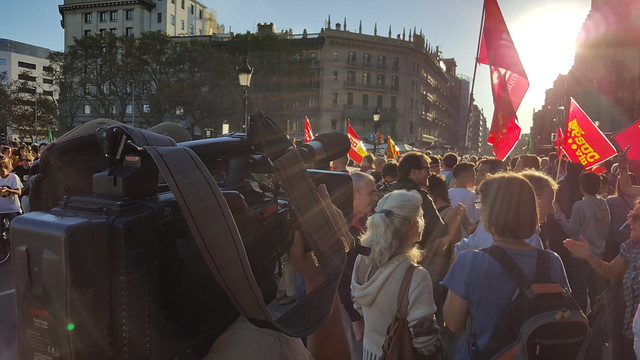We are in the Spanish city of Barcelona – one of those left-leaning cities around in Europe with a vivid protest scene – where Lucia distributes flyers against the planned Transatlantic Trade and Inv
We are in the Spanish city of Barcelona – one of those left-leaning cities around in Europe with a vivid protest scene – where Lucia distributes flyers against the planned Transatlantic Trade and Investment Partnership (TTIP) between the European Union and the United States.
Bonuses
- Lucía Bárcena: TTIP threatens democracy
- Jaime García-Legaz: TTIP creates 300.000 new jobs in Spain
- Jorge Santos: We could double our staff if TTIP will be signed
There is an increasing public backlash against globalisation fuelled by populist movements on the radical right and on the radical left wing, both searching for identity and a world protected against products coming from abroad.
Lucia coordinates protests all-over Spain through her group “Ecologists in Action.” Big business is bad, she believes:
“Our democracy is in big threat: we could lose our sovereignty as people,” Lucia told Euronews. “With this treaties we transfer our powers, our public institutions, the civil society into the hands of big cooperations… and with this treaties, basically, we are killing the states.”
Here's why we should hope Wallonia holds firm against the fake trade deal Canada and EU are trying to strike: https://t.co/TK3szP0Eot#CETA
— GeorgeMonbiot (@GeorgeMonbiot) October 24, 2016
“Let’s grab our microphone boom and knock on the door of FICOSA – a Spanish multinational that produces car components. Almost all major car brands around the world use products manufactured by FICOSA – a real global player with an annual turnover of over one billion euros. FICOSA has branches in Europe, Asia, South and North America.
“It was not easy to get a filming authorisation: many companies hide away when asked to speak up for TTIP. What are the advantages of transatlantic free-trade agreements? “
We met with FICOSA top-manager Emilio Varela, vice-president of the Spanish association of car components manufacturers (SERNAUTO). Seatbelts, lights, breaks… most components have to be certificated twice – on both sides of the Atlantic – for the car component industry that ads up to twelve billion dollars per year… TTIP could save this.
“Twenty-six percent of the costs of our products are increased because of different regulations between us and the USA,” said Varela. “If this (TTIP) agreement could solve this point, our success would be bigger, our business would be much bigger and a lot of employment would be created in our country… if we gain twenty percent more of turnover (the car component industry) could create 15,000 jobs in Spain.”
Back in Barcelona we meet again with (anti-TTIP-fighter) Lucia in a colourful soap-shop. LUSH is a global player too – employing 15,000 people in outlets allover the world, 250 in Spain… but: backing anti-globalisation activists such as Lucia… LUSH produces locally – and: fights against animal testing, compliance manager Victor Manuel explained. TTIP would open up European doors for cosmetics not in line with the company’s ethical branding, he fears.
“One good example against TTIP is that we will lose the protection against the use of forbidden chemicals in cosmetics in Europe: in Europe there are some 1,300 banned chemical products in cosmetics – while in the USA there are only eleven chemicals banned from cosmetics,” Lush’s compliance manager Victor Manuel told Euronews.
“An example is lead: in the USA it is still used in cosmetics such as in lipsticks… not like this one produced by us,” added Manuel.
“Labelling is the only tool people have to understand what exactly the product contains they are buying, where it comes from and what exactly is in it,” Barcena said. “But the TTIP agreement is threatening this (labelling system containing this) basic information important for the consumer whether to buy or not to buy a product – depending on our ethical values.”
Flores Valles, located in the outskirts of Madrid, is one of the oldest industrial companies of Spain. It was founded back in 1830, since six generations it is family owned. Today, Flores Valles is one of the world leaders for laboratory furniture and fume hoods.
The head of the international division, Jorge Santos, is from Portugal. When Flores Valles decided to open a branch in New York, the top-manager tried to get a working or an investor visa. The USA refused, obliging the company to hire local staff. (The company lost time and money.) With TTIP such a (kind of absurd) situation would no longer occur.
Jorge Santos, the head of Flores Valles’s international division said: “America still has the Buy-American-Act: for some products you still have to buy American-made steel, American-made concrete, American-made wood products… because for strategic products in the USA an European company can not even run for – unless they buy all products, all raw materials in the US and manufacture the whole thing in the US… We ourselves have a company within our group that produces the industrial kitchens for the high-speed trains: we won a big contract in the US to furnish 50 trains and we had to do a transfer of technology to an American company that we joined-ventured with in order to manufacture – EVERY – SINGLE – PIECE of that equipment in the United States.”
 Anti-TTIP fighters meet to prepare next days demonstration. Lucia plans a human chain encercling the premises of the European Union in Barcelona. In the meantime, on the other side of the Atlantic, Clinton meets Trump: while Clinton’s position on TTIP is ambiguous, the right-wing presidential candidate Trump claims protectionist rules. Populist far-right in the US and radical left in Spain share similar positions…
Anti-TTIP fighters meet to prepare next days demonstration. Lucia plans a human chain encercling the premises of the European Union in Barcelona. In the meantime, on the other side of the Atlantic, Clinton meets Trump: while Clinton’s position on TTIP is ambiguous, the right-wing presidential candidate Trump claims protectionist rules. Populist far-right in the US and radical left in Spain share similar positions…
We met the Spanish secretary of state for trade in mid-October. Together with his Swedish counterpart, he rallied for TTIP support amongst European colleagues. Together with ministers from Portugal, the Czech Republic, Denmark, Finland, the Baltic states, Italy, Ireland and the United Kingdom he sent an open letter to the European Commission, urging a relaunch of the negotiations.
“On both sides of the Atlantic: who are the TTIP-killers, be it in Europe, be it in the United States?”
“We see that there is some opposition to TTIP, that is true,” said Spanish Secretary of State for Trade Jamie Garcia-Legaz Ponce. “We have seen that on the extreme left and on the extreme right – in many areas across the European Union. – On the US side there is some protectionist movement, coming from populist movements as well.
“We have seen Mister Trump attacking free trade agreements. – We believe that this makes little sense: The prosperity of the US has been propelled by free trade in the last few decades. – Free trade is good and TTIP is a way of moving free trade forward.”
Lucia too is not against free trade. But she is against TTIP – believing that the transatlantic trade agreement could downgrade ecological and social standards used in Europe. Today, some 2,000 people are on the street in Barcelona, in Madrid at the same moment an estimated 20,000 protesters are demonstrating.
“Well, the voices of TTIP supporters are almost not audible – while the voices of TTIP opponents are very noisy… I will ask, why people here around are against TTIP.”
Opponents have concerns that a special arbitration system will be created in order to settle disputes between states and foreign investors. Critics say, this would allow multinationals to dictate public policy. Wrong – the European Commission says. True – believes Tito Alvarez, coordinating the protest of taxi-drivers.
Taxi protest coordinator Tito Alvarez told Euronews: “Those treaties are killer agreements, they make people to slaves, they are just looking for more economic benefits and they are going to abolish all norms/standards, rules and laws established in Europe since hundreds of years…”
Is TTIP dead? Maybe not – but the proposed free trade deal between the EU and the United States is at best years away… Unchaining growth, jobs-creation and TTIP depends on the outcome of elections on both sides of the Atlantic.

